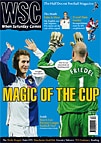 Richard Barker recalls when a top-flight side last hit nine
Richard Barker recalls when a top-flight side last hit nine
When Manchester United entertained Ipswich Town at Old Trafford on March 4, 1995, there was little reason to expect much of a contest. Defending champions United were locked in a struggle with Blackburn Rovers at the top, while Ipswich were going hell-for-leather to clinch the bottom spot.
Despite somehow contriving to lose to Ipswich earlier in the season (one of seven games Town managed to win all year), United had good cause to view the impending visit of George Burley’s side as an opportunity to boost their goal difference. Ipswich had already been knocked out of the FA Cup at Wrexham and, although they had won at Anfield a week later, relegation was all but assured by the time they arrived at Old Trafford.
Ipswich fielded one of the slowest back fours the game has seen, sending out David Linighan, Frank Yallop, Neil Thompson and the once-great John Wark to protect Craig Forrest’s goal. The quartet boasted a combined age of 129 and it seemed reasonable to expect that their experience would be vital to Ipswich’s chances of containing a United side including Mark Hughes, Andy Cole, Andrei Kanchelskis and the 21‑year‑old Ryan Giggs. At the other end, United’s hopes of a clean sheet seemed to hinge on whether or not Steve Bruce and Gary Pallister could shackle the predatory Lee Chapman. Paul Mason, a two-goal scorer when Ipswich had won 3-2 at Portman Road, was left on the bench.
All things considered, Ipswich did quite well to hold out for the opening quarter of an hour, before Roy Keane opened the scoring. Andy Cole added a brace before half-time to make it 3‑0. While defeat was a near certainty, at that stage there was no reason to anticipate humiliation on an epic scale. After all, no team had ever scored more than seven in the Premier League’s brief existence and it seemed reasonable to expect Ferguson to withdraw some of his players in order to keep them fresh for more testing challenges ahead. Unfortunately, replacing the relatively ponderous Keane with the speedy Lee Sharpe was not exactly what Ipswich had been hoping for and over the ensuing 45 minutes Burley’s team were cut to ribbons.
The main beneficiary was Cole. He had scored just twice since signing from Newcastle in January but, offered the freedom of the pitch by Ipswich, he duly completed his hat-trick within eight minutes of the restart. That prompted the start of a tricky period for Ipswich, as they conceded another three in 12 minutes. Mark Hughes might have reserved his best goals for the big occasion, but he was determined not to be left out here and hammered home the next two goals before Cole made it 7-0 after 65 minutes.
At that stage something seemed to stir within the Ipswich ranks – call it professional pride or simply panic caused by the realisation that they might finish up on the wrong end of a double-digit score. They duly redoubled their efforts and dug in for the next seven minutes, before going 8-0 down to a ludicrous goal that just about set the tin hat on the afternoon.
Some players might have surrendered without a fight, but Forrest, the Canadian in the Ipswich goal, was not one of them. Only a hero could have got himself booked for handling outside his area in such ridiculous circumstances. Likewise, only a man with genuine passion for the cause could have maintained his protests after referee Graham Poll allowed Paul Ince to take a quick free‑kick and chip the ball into the empty net. It was an heroically pointless gesture.
Cole completed the rout with three minutes to go and, although United pushed for the killer tenth that would doubtless have broken the back of Ipswich’s spirited resistance, they were forced to settle for nine. The travelling Ipswich fans responded to United’s cries of “we want ten” with “we want one”.
Ultimately, it was a massacre by any definition and 12 seasons later remains the benchmark for Premier League brutality after a second half in which Ipswich conceded more goals (six) than they managed to score (five) in the final 11 games of the season. United were forced to surrender their title, but Ipswich withstood the challenge of Leicester City to finish bottom.
The footnote to the whole sorry incident was provided by Alan Shearer, possibly aggrieved at only scoring three against Ipswich five weeks previously. Shearer reacted to Cole’s haul by huffily observing: “There are no easy games in football… apart from Ipswich at home.”
Whether or not he revised that opinion the following year when Blackburn, the defending champions, were dumped out of the FA Cup at Ewood Park by a certain Suffolk side remains undocumented.
From WSC 252 February 2008